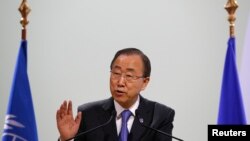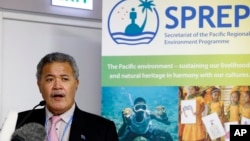UN Secretary General Ban Ki-moon urged nations to make the compromises necessary to put the planet on a carbon-free trajectory or risk a “climate catastrophe,” as negotiators raced to reach a climate agreement by Friday.
“Your decisions can lay the foundations for a sustainable future where all the peoples and planet can thrive,” Ban told delegations from nearly 200 nations meeting at Le Bourget outside Paris Monday. “Your work here this week can help eradicate poverty, spark a green energy revolution, provide jobs, opportunities and hope for tomorrow.”
On Saturday, negotiators produced a first draft agreement to curb greenhouse gas emissions, which French Foreign Minister Laurent Fabius, who is presiding over the climate talks, called “a step” toward a final deal. Fabius, who has divided ministers into working groups to tackle the biggest themes, wants what he calls "the first vision" of the final agreement by Wednesday.
Ban’s address set the tone for Monday’s talks among ministers who have arrived to give a final push to the climate negotiations at Le Bourget, outside Paris.
'What did you do?'
In speeches Monday, many used dramatic language to sum up the stakes, saying negotiators faced a historic choice with consequences for both the planet and humanity.
“I’m often asked what keeps me up at night,” said executive secretary of the UN Framework Convention on Climate Change, Christiana Figueres, told delegates. “Here’s what keeps me up: I often see seven sets of eyes of seven generations beyond me, asking me: ‘What did you do? What did you do?
“The same question will be asked of each of you,” Figueres added. “May we all be able to stand tall and clearly say, ‘We did everything that was necessary.’”
The stakes are highest for some of the world’s poorest and most vulnerable nations, who are pushing for an agreement that goes further, and limits global warming to no more than 1.5C above pre-industrial levels, instead of the current 2C goal.
Going beyond 1.5 degrees, says Tuvalu’s Prime Minister Enele Sosone Sopoaga, will mean the demise of his tiny island nation and others like it.
“There is a big whale in the lagoon, as we say in the Pacific. We must rise above this fear, and address this whale or else we all perish,” he said.
So far, national climate plans tabled by 186 countries will limit global temperature rise to nearly 3C — about double the ceiling that islands like Tuvalu are demanding.
'Rising tide of support'
Giving impetus to the Paris talks, analysts say, is a broad will to avoid a repeat of 2009 climate change negotiations in Copenhagen, widely considered a failure. Known technically as COP21, this year’s conference is also driven by grim new statistics showing 2015 will likely be the world’s warmest in history — topping a string of other record-breaking years. In another reminder of the fallout of fossil fuel emissions, the Chinese capital Beijing went on the highest “red alert” Monday for smog levels.
Yet another driver is what Ban called “a rising tide of support” for a tough agreement on the part of local governments, businesses and ordinary citizens, some of whom are attending the climate talks outside Paris.
“The world is expecting more from you than half-measures and incremental approaches,” he told negotiators.
Environmental groups are closely following the progress of discussions that are entering their second week, and still remain pitted by complex divisions, including financing for developing countries to adapt to climate change.
Jennifer Morgan, head of the climate program for the Washington DC-based World Resources Institute think-tank, described Saturday’s draft agreement as showing “more common ground.”
“Though there is plenty of hard work ahead, the table is now set for ministers to get this done,” she said in a statement.
At a press conference Monday, NGO representatives were quick to point out shortfalls like vague language and goals, particularly on climate financing. Referring to the term "climate neutrality," Martin Kaiser who heads international climate politics at Greenpeace, asked, “Could someone explain what this means?”
Secretary-General Ban is calling for a review of draft national plans every five years, starting before 2020, not only to make sure countries abide by them, but also improve on them. Even as he urged negotiators to reach an ambitious accord, he also called for compromise in overcoming differences, with the understanding that whatever deal is reached in Paris can be strengthened.
“Sometimes perfection may be our enemy,” he said.





